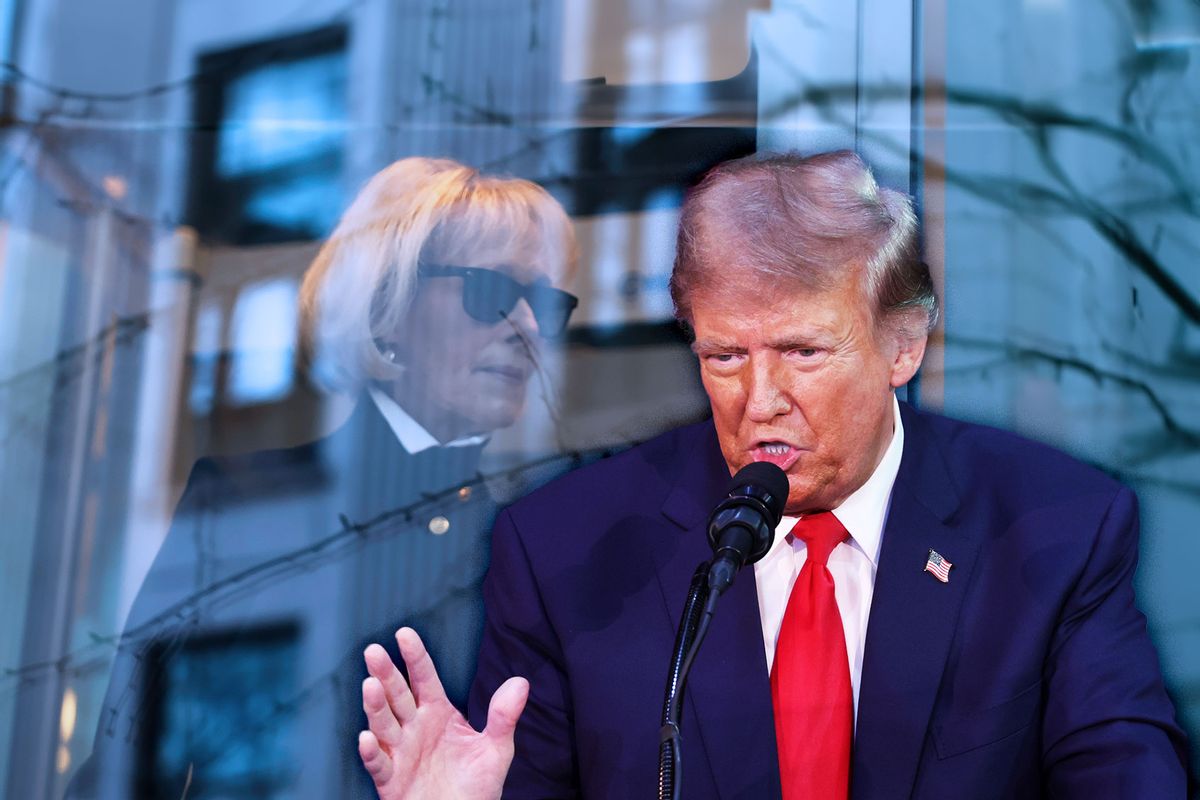“It will cost him”: Experts warn new E. Jean Carroll filing signals bad news for Trump

Throughout the ongoing trial in E. Jean Carroll’s defamation suit against Donald Trump, the former president has maintained that he never knew the writer and has accused her of fabricating allegations of sexual assault against him.
Carroll’s attorney Roberta Kaplan notified U.S. District Judge Lewis Kaplan over the weekend that she will be using Trump’s words as evidence in the ongoing trial, according to Business Insider.
The defamation lawsuit revolves entirely around the claim that Trump defamed Carroll, asserting that she lied about him raping her in a department store in the mid-1990s.
Last spring, a jury found that Trump sexually abused Carroll and then defamed her branding her a liar and saying that her accusations were a financially motivated “con job.” The jury awarded Carroll $5 million in damages.
Now, Trump has found himself once more in the same federal courthouse, once again defending himself against allegations of defamation.
In her opening statement, Carroll’s lawyer Shawn Crowley said that the former president used his position in the White House “to lie about what he had done, to attack Ms. Carroll’s hard-earned integrity and to falsely accuse her.”
However, Trump attorney Alina Habba countered that Trump was defending himself when he refuted Carroll’s allegation. She told the jury that the ensuing anger from Trump’s supporters was predictable and asserted that Carroll exacerbated the situation with her appearances promoting her book.
Trump, who has attacked Carroll since she first accused him of rape in a book excerpt five years ago, has continued to push this narrative even before his day in court calling her allegations a “fake story” and a “witch hunt.”
While Trump’s denials outside the court do not matter in terms of supporting claims of innocence, his continued “commenting and attacking” of Carroll can be introduced for the purposes of “proving liability” or “determining damages,” David Schultz, professor of political science at Hamline University, told Salon.
“These statements can be used to show defamation and also for the purpose of determining both real or compensatory damages and punitive damages,” Schultz said. “The more Trump defames arguably the more liable he is and the more it will cost him.”
Roberta Kaplan in a letter to the judge on Sunday accused Trump’s defense team of orchestrating a “spectacle” when they sought a mistrial in front of the jury last week, Insider reported.
One of the exhibits highlights a press conference that Trump held after a contentious first day in court on Wednesday, according to the outlet.
“I have no idea who she is,” Trump said, adding that the case was “a rigged deal. It’s a made-up, fabricated story.”
The exhibits also include a Truth Social post from Trump as early as Saturday in which he denies knowing Carroll.
“Until the filing of this ridiculous lawsuit against me, I knew nothing about this woman, never heard of her, never touched her, had nothing to do with her,” Trump wrote.
Last week, the judge threatened to throw Trump out of the courtroom for making comments arguing he did not sexually abuse Carroll or that he never met her.
Kaplan informed the jury that it is not their responsibility to determine the truthfulness of Carroll’s allegations but instead, they are tasked with determining the damages of defamation over statements Trump made denying the assault and saying he never met her.
“Since these statements have already been found to be adjudicated as actionable defamation, every time Trump repeats them, he can be sued,” Los Angeles entertainment and libel law attorney Tre Lovell told Salon.
More importantly, the repeated statements can be used as evidence to show that Trump has “ill will, spite or hatred” for Carroll, which goes to the issue of punitive damages, Lovell said.
“Carroll’s attorneys are going to use the fact Trump keeps repeating the statements to demonstrate that the only way he will stop is if he’s forced to pay a big judgment,” he added. “The fact that the earlier judgment of $5 million rendered in the first trial was not enough to dissuade Trump from repeating the statements is good evidence that a much larger verdict will be necessary.”
Want a daily wrap-up of all the news and commentary Salon has to offer? Subscribe to our morning newsletter, Crash Course.
In a conference, the former president also accused Carroll of deleting “massive amounts of evidence,” and his lawyer requested a mistrial. She argued that Carroll got rid of evidence by deleting emails that contained death threats against her, Insider reported.
But her lawyer argued that Carroll had not initiated her lawsuit when she initially removed certain death threats from her inbox in 2019. She argued that Habba’s request to prevent the jury from considering damages for the death threats would unfairly restrict the jury’s role.
Deleted evidence won’t be that “significant” in terms of rendering a verdict, and if anything, could be argued against Carroll in that such evidence was to benefit her, Lovell said.
If Trump continues to make public comments, they could serve as evidence to demonstrate his intent and attitude, potentially indicating “malice or recklessness,” trial attorney Tray Gober told Salon.
“If there are inconsistencies between Trump’s public statements and his courtroom testimony, this could weaken his defense and influence the jury’s perception of his credibility,” Gober said.
The former president’s “persistent public denials” of the allegations, despite a previous jury finding him liable, could “exacerbate” the situation, potentially leading to increased damages, he added.
“His ongoing denials might be interpreted as continued harm to Carroll’s reputation, impacting the case’s legal dynamics,” Gober said.
Read more
about the Trump defamation case

